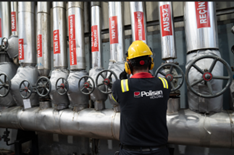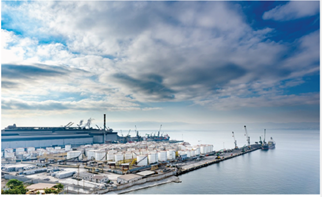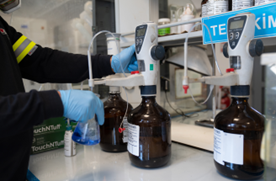A leading project by: Polisan Kimya (Türkiye) Subcategory: Big projects in small companies..
In a continuous effort towards more sustainability, Polisan Kimya analyses the environmental dimensions of its products throughout their lifecycle, from raw material acquisition to delivery to the end user, in accordance with ISO 14025 Standard and EN 15804 Norm. This approach allows the company to measure and manage the impact of its products on global warming potential. In 2023, the company obtained Environmental Product Declaration (EPD) certificates for 27 products in eight construction chemicals product groups. The company plans to continue its efforts by including an ecoinvent-based software in its corporate inventory, conducting lifecycle analyses with internal resources at the product design stage, and extending these analyses to all products.
Energy efficiency and emission reduction

The company seeks to improve its performance and reduce emissions through energy-efficient technology choices, efficiency-enhancing projects, and practices that minimise energy losses. Additionally, hydrogen-rich waste gas from resin production was utilised by burning it to recover energy, which was then used to meet the facility’s steam needs, contributing significantly to energy efficiency and emission reduction efforts. In 2023, the company achieved approximately 3.6 million kWh energy savings and prevented 1,720 tonnes of carbon emissions.
Emission reduction in the value chain

Circular economy efforts

The R&D teams focus on projects based on the principles of circular economy and the use of bio-based raw materials as alternatives to fossil-based raw materials.
The company implements innovative circular economy practices to transform waste and other industrial wastes into raw materials with higher added value. Key efforts include:
- Recovery of Concrete Waste: Using waste generated in the construction chemicals quality control laboratory as raw material in cement production, resulting in significant improvements in waste management and savings in the use of natural resources.
- Recovery of Molasses and Lignin: Using molasses waste from sugar production and lignin waste from paper and cellulose production as thickening agents in construction chemicals, reducing dependency on imports and transforming these byproducts into valuable raw materials.
- Recovery of Distillate Waste: In the last quarter of 2023, the company initiated an industrial symbiosis project to reevaluate distillate waste, successfully converting it into high-value-added raw materials for use in the glass and gel fuel industries, contributing to the circular economy.
- Reuse and Extension of Life of Electronic Waste: Selling electronic devices that have reached the end of their replacement period to employees for reuse, extending the lifecycle of the devices and preventing the generation of electronic waste.
From carbon management to energy efficiency projects, the Polisan Kimya’s R&D efforts, based on circular economy principles and sustainable value chain management, aim to minimise environmental impact and contribute to the company’s 2053 net zero emission target.
Follow Polisan Kimya
- Polisan Kimya on Instagram
- Polisan Kimya on LinkedIn
- Polisan Kimya on Youtube











